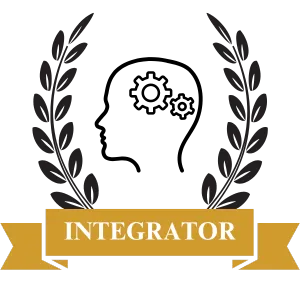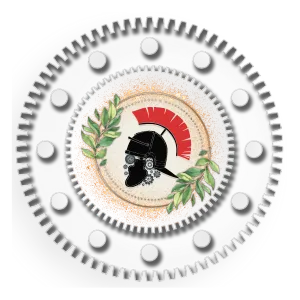

Helping Visionaries
Build Empires
Creating Order from Chaos:
Your Strategic Partner in Business Growth

Helping Visionaries
Build Empires
Creating Order from Chaos:
Your Strategic Partner in Business Growth


Organization

Communication

Accountability
Are You A Visionary Who Needs An Integrator?

You Always See the BIG picture
You Create Vision & Direction
You Focus on BIG Deals & Relationships
You Know the Industry & Market

We Focus on the Details
We Execute Vision & Steer the Ship
We Manage People & Projects
We Oversee Day-to-Day Operations
Not quite sure where you fit? Click here to take THE CRYSTALLIZER ASSESSMENT™ now and find out!
Are You A Visionary Who Needs An Integrator?

You Always See the BIG Picture
You Create Vision & Direction
You Focus on BIG Deals & Relationships
You Know the Industry & Market

We Focus on the Details
We Execute Vision & Steer the Ship
We Manage People & Projects
We Oversee Day-to-Day Operations
IMPERIAL

INTEGRATORS
Integrators are the organizational glue that holds your business together. We make all the gears turn.
In traditional roles, we would be your President, General Manager, or Chief Operating Officer.
At Imperial Integrators, our goal is to provide the same level of capability and competency in a capacity that is right for you.

IMPERIAL
INTEGRATORS
Integrators are the organizational glue that holds your business together.
We make all the gears turn.
In traditional roles, we would be your President, General Manager, or Chief Operating Officer.
At Imperial Integrators, our goal is to provide the same level of capability and competency in a capacity that is right for you.
Empire-Building Made Easy
Tailored Plans To Fit Every Business & Budget
Integrator Advisor
Works 1:1 with You
Audits Your Plans
Reviews Strategies
Evaluates Systems
Contingency Planning
Monthly Accountability
& Review Sessions
on Zoom
Integrator Consultant
Works with Your
Leadership Team
Sets Up & Manages
Systems & Processes
KPI Tracking
& Reporting
Weekly L10
Zoom Meetings
Daily V/I Chat & Loom
Communications
Fractional Integrator
Works with Your
Entire Team
Builds & Develops
Your Staff
Project Management
& Reporting
Weekly V/I
Same Page Phone Calls
Daily Team Chat & Loom
Communications
Interim Integrator
Runs the Day-to-Day
Functions of Business
Management of
External Teams
Quarterly Review
Zoom Meetings
Annual Company
In-Person Forecasting
Phone Availability
For Entire Team

Empire-Building
Made Easy
Tailored Plans To Fit
Every Business & Budget
Integrator Advisor
Works 1:1 with You
Audits Your Plans
Reviews Strategies
Evaluates Systems
Contingency Planning
Monthly Accountability
and Review Sessions
Integrator Consultant
Works with Your
Leadership Team
Sets Up & Manages
Systems & Processes
KPI Tracking
& Reporting
Weekly L10
Zoom Meetings
Daily V/I Chat & Loom
Communications
Fractional Integrator
Works with Your
Entire Team
Builds & Develops
Your Staff
Project Management
& Reporting
Weekly V/I
Same Page Phone Calls
Daily Team Chat & Loom
Communications
Interim Integrator
Runs the Day-to-Day
Functions of Business
Management of
External Teams
Quarterly Review
Zoom Meetings
Annual Company
In-Person Forecasting
Phone Availability
For Entire Team

Frequently Asked Questions

What is an Integrator?
An Integrator is a key role within an organization, often seen within the framework of the Entrepreneurial Operating System (EOS). The Integrator is responsible for harmonizing all elements of the organization, ensuring that all departments and functions are working together effectively towards the same goals.
They are the binding force that holds the organization together, making sure that the vision set by the Visionary is executed effectively. They manage the day-to-day operations, lead the team, and hold people accountable.
In addition to this, the Integrator is a leader who has a deep understanding of the business and its various functions. They are able to see the bigger picture and understand how each department contributes to the overall success of the organization. They are also skilled at managing relationships and resolving conflicts that may arise between different departments.
The Integrator plays a crucial role in strategic planning, setting the direction of the organization, and ensuring that all departments are aligned with this direction. They also play a key role in decision-making processes, ensuring that decisions are made with the best interest of the organization in mind.
This role requires a unique set of skills, including the ability to manage and resolve conflict, strong leadership and communication skills, and the ability to see the big picture and understand how all parts of the organization fit together.
What are the Integrator responsibilities?
The responsibilities of an Integrator within an organization can vary, but they generally include the following:
Harmonizing the Organization: The Integrator ensures that all departments and functions are working together effectively towards the same goals. They are the binding force that holds the organization together.
Executing the Vision: The Integrator works closely with the Visionary (often the CEO or business owner) to understand their vision for the company and then turns that vision into an actionable plan.
Managing Day-to-Day Operations: The Integrator oversees the daily operations of the business, ensuring that everything runs smoothly and efficiently.
Leading the Team: The Integrator often leads the management team, ensuring that everyone is working effectively and efficiently towards the company's goals.
Holding People Accountable: The Integrator is responsible for holding people accountable, ensuring that tasks are completed on time and objectives are met.
Strategic Planning: The Integrator plays a crucial role in setting the strategic direction of the organization and ensuring that all departments are aligned with this direction.
Decision Making: The Integrator often plays a key role in decision-making processes, ensuring that decisions are made in the best interest of the organization as a whole.
Conflict Resolution: The Integrator is skilled at managing relationships and resolving conflicts that may arise between different departments or team members.
Communication: The Integrator ensures clear and effective communication across all levels of the organization.
These responsibilities make the Integrator a crucial part of any organization, as they ensure the smooth operation of the business and the effective execution of the company's vision.
Do I really need an Integrator?
Whether or not you need an Integrator in your organization depends on several factors, including the size of your business, the complexity of your operations, and your own strengths and weaknesses as a leader.
Here are a few reasons why you might need an Integrator:
You're a Visionary: If you're a Visionary type of leader - someone who is great at big-picture thinking, generating ideas, and setting the strategic direction, but less interested or skilled in the day-to-day operations of your business - an Integrator can complement your skills and ensure that your vision is effectively executed.
Your Business is Growing: As businesses grow, they often become more complex, with more employees, more customers, and more moving parts to manage. An Integrator can help manage this complexity and ensure that all parts of the business are working together effectively.
You're Feeling Overwhelmed: If you're feeling overwhelmed by the demands of running your business, an Integrator can take some of the load off your shoulders. They can manage the day-to-day operations of the business, freeing you up to focus on what you do best.
There's a Lack of Accountability: If tasks are falling through the cracks and there's a lack of accountability in your organization, an Integrator can help. They can ensure that everyone is clear on their roles and responsibilities and that tasks are completed on time.
There's a Lack of Cohesion: If your team or departments are working in silos and not effectively collaborating, an Integrator can help bring everything together and ensure that everyone is working towards the same goals.
However, it's important to note that hiring an Integrator is a significant decision that should be made carefully. The right Integrator can be a tremendous asset to your organization, but the wrong one can cause problems. It's important to find someone who is a good fit for your organization's culture and who has the skills and experience necessary to be effective in the role.
How does an Integrator interact with other roles in the organization?
An Integrator interacts with other roles in the organization in several key ways:
Collaboration: The Integrator works closely with all departments and teams within the organization. They ensure that everyone is working towards the same goals and that there is clear communication between all parties.
Leadership: The Integrator often leads the management team, providing guidance and direction. They ensure that everyone is clear on their roles and responsibilities and that tasks are completed on time.
Conflict Resolution: The Integrator plays a key role in resolving conflicts that may arise between different departments or team members. They work to find solutions that are in the best interest of the organization as a whole.
Strategic Planning: The Integrator works closely with the Visionary (often the CEO or business owner) and other key stakeholders to set the strategic direction of the organization. They ensure that all departments are aligned with this direction and are working towards the same strategic goals.
Decision Making: The Integrator often plays a key role in decision-making processes within the organization. They ensure that decisions are made in the best interest of the organization and that all relevant parties are involved in the decision-making process.
In essence, the Integrator serves as the bridge between different roles within the organization, ensuring that everyone is working together effectively and efficiently.
Can a small business benefit from having an Integrator?
Absolutely, a small business can greatly benefit from having an Integrator. Here's why:
Focus on Strengths: Small business owners often wear many hats, managing everything from sales and marketing to finance and HR. An Integrator can take over the management of day-to-day operations, allowing the business owner to focus on their strengths and on strategic growth initiatives.
Improved Efficiency: An Integrator can help improve efficiency by ensuring that all parts of the business are working together effectively. They can identify and resolve bottlenecks, streamline processes, and implement systems that help the business run more smoothly.
Strategic Planning: Even small businesses need a strategic plan. An Integrator can help develop and implement this plan, ensuring that all team members understand the business's goals and their role in achieving them.
Conflict Resolution: In small teams, conflicts can have a big impact. An Integrator can help manage and resolve conflicts, ensuring that the team works well together.
Growth and Scaling: As a business grows, it can become more complex. An Integrator can manage this complexity, helping the business scale without becoming overwhelmed.
While hiring an Integrator can be a significant investment, especially for a small business, the benefits they bring can make it a worthwhile one. They can free up the business owner's time, improve efficiency, and help the business grow and scale successfully.
Can the roles of the Visionary and Integrator be performed by the same person?
While it's theoretically possible for the same person to perform both the Visionary and Integrator roles, in practice it's often challenging and not typically recommended. Here's why:
Different Skill Sets: The Visionary and Integrator roles require different skill sets. Visionaries are big-picture thinkers, idea generators, and risk-takers. They're focused on the future and driving the company forward. Integrators, on the other hand, are great at execution, managing details, and keeping the team aligned and accountable. They're focused on the present and making sure the company operates smoothly. It's rare for one person to excel in both areas.
Different Focus: The Visionary is typically focused on external matters like market trends, competition, and strategic partnerships, while the Integrator is more internally focused, managing the day-to-day operations of the company and ensuring all departments are working together effectively.
Capacity: Both roles are demanding and time-consuming. Trying to perform both roles can lead to burnout and can also limit the company's growth because the leader's attention and energy are divided.
Healthy Tension: A certain amount of tension between the Visionary and Integrator roles can be healthy for a company. The Visionary can push for growth and innovation, while the Integrator can ensure that ideas are feasible and align with the company's resources and goals. If one person is trying to play both roles, this balance can be lost.
For these reasons, many companies find it beneficial to have separate individuals in the Visionary and Integrator roles. This allows each person to focus on their strengths and provides a balance of skills and perspectives that can drive the company forward.
How does an Integrator help in achieving the company's goals and objectives?
An Integrator plays a crucial role in achieving a company's goals and objectives in several ways:
Strategic Planning: The Integrator works closely with the Visionary and other leaders to develop strategic plans that align with the company's goals and objectives. They ensure that these plans are realistic, actionable, and understood by everyone in the organization.
Execution: Once the strategic plans are in place, the Integrator is responsible for executing them. They manage the day-to-day operations of the company, ensuring that all departments and teams are working effectively towards the set goals.
Alignment: The Integrator ensures that all parts of the organization are aligned and working towards the same objectives. They facilitate communication and collaboration between different departments and teams, helping to prevent silos and ensure everyone is moving in the same direction.
Accountability: The Integrator holds people accountable for their roles in achieving the company's goals. They track progress, manage performance, and ensure that everyone is doing their part.
Problem-Solving: When obstacles arise that could hinder the achievement of the company's goals, the Integrator is there to solve problems and make necessary adjustments. They are skilled at identifying issues, finding solutions, and making decisions that are in the best interest of the company.
Measurement: The Integrator establishes and tracks Key Performance Indicators (KPIs) to measure progress towards the company's goals. They use this data to make informed decisions and adjustments as needed.
By fulfilling these responsibilities, the Integrator plays a vital role in driving the company towards its goals and objectives. They ensure that the company's vision is turned into action and that this action leads to desired results.
How can an Integrator help a business scale up?
An Integrator can play a crucial role in helping a business scale up in several ways:
Strategic Planning: Scaling a business requires careful planning. An Integrator can help develop and implement a strategic plan that aligns with the company's growth objectives, ensuring that the business scales in a sustainable and controlled manner.
Systems and Processes: As a business grows, it often needs to implement new systems and processes or refine existing ones to handle increased complexity. An Integrator can oversee this, ensuring that the business operates efficiently at a larger scale.
Team Management and Development: Scaling often involves expanding the team. An Integrator can help manage this growth, ensuring that new team members are integrated effectively and that the entire team is aligned and working towards the same goals.
Resource Allocation: Scaling a business often requires significant resources. An Integrator can help ensure that these resources are allocated effectively, balancing the needs of growth with the ongoing operations of the business.
Performance Tracking: As a business scales, it's crucial to track performance to ensure that growth is happening in a sustainable and profitable way. An Integrator can establish and track key performance indicators (KPIs), using this data to make informed decisions about the scaling process.
Risk Management: Scaling a business also involves risks. An Integrator can help identify and manage these risks, ensuring that the business scales successfully without jeopardizing its existing operations or financial stability.
By fulfilling these roles, an Integrator can help a business navigate the challenges of scaling, ensuring that growth is managed effectively and leads to long-term success.
What are some key performance indicators (KPIs) for an Integrator?
Key Performance Indicators (KPIs) for an Integrator can vary depending on the specific goals and needs of the organization. However, here are some common KPIs that could be used to measure the performance of an Integrator:
Operational Efficiency: This could be measured by tracking metrics like process cycle times, error rates, or productivity levels. Improvements in these areas can indicate that the Integrator is effectively managing the organization's operations.
Goal Achievement: The Integrator is responsible for ensuring that the organization's goals are met. This could be measured by tracking the percentage of strategic objectives achieved, or the progress made towards specific project milestones.
Team Performance: As the Integrator often leads the management team, their performance could be measured by tracking team-related metrics, such as employee engagement levels, turnover rates, or team productivity.
Financial Performance: The Integrator plays a key role in the financial success of the organization. This could be measured by tracking metrics like revenue growth, profit margins, or return on investment.
Risk Management: The Integrator is responsible for managing risks within the organization. This could be measured by tracking the number of identified risks that have been effectively mitigated.
Stakeholder Satisfaction: The Integrator often interacts with various stakeholders, including employees, customers, and partners. Their performance could be measured by tracking stakeholder satisfaction levels through surveys or feedback.
Remember, the specific KPIs used to measure an Integrator's performance should be tailored to the needs and goals of your organization. It's also important to review and update these KPIs regularly to ensure they remain relevant and effective.
How does an Integrator help manage change within an organization?
Managing change within an organization is a complex task that requires careful planning, clear communication, and strong leadership - all areas where an Integrator excels. Here's how an Integrator can help manage change:
Planning and Strategy: The Integrator can help develop a strategic plan for the change, outlining the steps that need to be taken, the resources required, and the timeline for implementation. They can also help identify potential risks and develop strategies to mitigate them.
Communication: Clear and consistent communication is crucial during periods of change. The Integrator can ensure that all stakeholders are kept informed about the reasons for the change, the benefits it will bring, and how it will be implemented. This can help reduce uncertainty and resistance.
Leadership: The Integrator can provide strong leadership during the change process, guiding the team through the transition and providing support and reassurance. They can also help manage any conflicts or issues that arise.
Implementation: The Integrator can oversee the implementation of the change, ensuring that it is carried out smoothly and effectively. They can coordinate the various tasks and teams involved, monitor progress, and make adjustments as needed.
Evaluation: After the change has been implemented, the Integrator can help evaluate its impact. This can involve gathering feedback, analyzing performance data, and assessing whether the change has achieved its intended goals.
By fulfilling these roles, an Integrator can help ensure that changes within an organization are managed effectively, leading to successful outcomes and minimal disruption.
How does an Integrator contribute to team development and culture?
An Integrator plays a significant role in team development and shaping the culture of an organization in several ways:
Defining Roles and Responsibilities: The Integrator helps define clear roles and responsibilities for team members. This not only helps in the smooth functioning of the organization but also ensures that each team member understands their role and how it contributes to the overall goals of the organization.
Fostering Collaboration: The Integrator works to foster a culture of collaboration and teamwork. They ensure that all departments and teams are working together effectively and that communication is clear and open.
Developing Talent: The Integrator plays a key role in talent development. They can identify the strengths and weaknesses of team members, provide coaching and feedback, and help individuals grow and develop in their roles.
Building a Positive Culture: The Integrator can help shape the culture of the organization. They can work to create an environment that values respect, integrity, innovation, and other positive attributes. They can also help to ensure that the organization's values are lived out in its day-to-day operations.
Managing Conflict: The Integrator is often responsible for managing conflict within the team. They can help resolve issues in a way that is fair and respectful, helping to maintain a positive team culture.
Promoting Accountability: The Integrator promotes a culture of accountability. They ensure that team members are held accountable for their responsibilities and that they are recognized for their achievements.
By fulfilling these roles, an Integrator can help develop a strong, cohesive team and a positive, productive culture within the organization.
How does an Integrator handle communication within the organization?
An Integrator plays a crucial role in facilitating effective communication within an organization. Here's how:
Setting Clear Expectations: The Integrator ensures that everyone in the organization understands their roles, responsibilities, and the expectations placed on them. This includes communicating strategic goals, project objectives, and performance standards.
Facilitating Open Dialogue: The Integrator encourages open and honest communication among all team members. They create an environment where people feel comfortable sharing their ideas, concerns, and feedback.
Managing Meetings: The Integrator often leads team meetings, ensuring they are productive and focused. They set the agenda, guide the discussion, and ensure that key points and decisions are clearly communicated.
Resolving Conflicts: The Integrator plays a key role in conflict resolution. They facilitate discussions between parties, helping them to communicate their perspectives and find a resolution.
Communicating Change: When changes occur within the organization, the Integrator ensures that they are communicated effectively. They explain the reasons for the change, how it will be implemented, and how it will affect the team.
Providing Feedback: The Integrator provides regular feedback to team members, helping them to understand their performance and areas for improvement. They also encourage feedback from team members, using it to improve processes and systems.
Liaising Between Teams: The Integrator often acts as a liaison between different teams or departments, ensuring that information is shared effectively and that all parts of the organization are aligned.
By managing communication in these ways, the Integrator helps to ensure that everyone in the organization is informed, aligned, and working effectively towards the same goals.
What are some examples of decisions an Integrator would typically make?
The decisions an Integrator makes can vary widely depending on the specific needs and circumstances of the organization. However, here are some examples of typical decisions an Integrator might make:
Operational Decisions: The Integrator often makes decisions related to the day-to-day operations of the business. This could include decisions about workflow processes, resource allocation, or the implementation of new systems or technologies.
Strategic Decisions: The Integrator plays a key role in strategic planning and may make decisions about the strategic direction of the company. This could include decisions about market positioning, growth strategies, or major investments.
Team Management Decisions: The Integrator often makes decisions about team management. This could include decisions about hiring or firing, team structure, or performance management.
Conflict Resolution Decisions: When conflicts arise within the team, the Integrator will often make decisions about how to resolve them. This could involve deciding on a course of action, mediating between parties, or implementing changes to prevent similar conflicts in the future.
Financial Decisions: Depending on the structure of the organization, the Integrator may make decisions related to the company's finances. This could include decisions about budget allocation, pricing strategies, or financial forecasting.
Risk Management Decisions: The Integrator may make decisions about how to manage risks within the organization. This could involve identifying potential risks, deciding on strategies to mitigate them, or making decisions in response to a crisis.
Remember, the specific decisions an Integrator makes will depend on their role within the organization, the nature of the business, and the challenges and opportunities the company is facing.
What is the role of an Integrator in a startup vs. a mature company?
The role of an Integrator can vary significantly between a startup and a mature company due to differences in size, structure, and strategic needs. Here's how:
In a Startup:
Wearing Multiple Hats: In a startup, an Integrator might have to take on multiple roles due to the smaller size of the team. They might be involved in everything from strategic planning to daily operations to HR and finance.
Building Systems and Processes: Startups often lack established systems and processes. An Integrator in a startup would play a key role in developing and implementing these, helping to create a solid foundation for the business to grow.
Driving Growth: Startups are typically focused on growth. The Integrator would work closely with the Visionary to develop and execute strategies for rapid growth.
Managing Uncertainty: Startups often operate in uncertain environments with many unknowns. The Integrator would need to be comfortable making decisions with limited information and adapting quickly to changes.
In a Mature Company:
Managing Complexity: Mature companies are typically larger and more complex. An Integrator in a mature company would focus on managing this complexity, ensuring that all parts of the organization are working together effectively.
Improving Efficiency: In a mature company, the Integrator might focus more on improving efficiency and productivity, optimizing existing systems and processes to improve performance.
Strategic Planning: While strategic planning is important in both startups and mature companies, in a mature company the Integrator might be more focused on long-term strategic planning, considering factors like market trends, competition, and the company's long-term vision.
Change Management: Mature companies often need to adapt to changes in the market or industry. The Integrator would play a key role in managing these changes, ensuring that the company adapts effectively while minimizing disruption.
In both cases, the Integrator plays a crucial role in helping the company achieve its goals. However, the specific responsibilities and challenges of the role can vary significantly depending on the stage of the company.
How does the Integrator role differ from a traditional COO or General Manager role?
The roles of an Integrator, Chief Operating Officer (COO), and General Manager (GM) have similarities, as they all involve overseeing the day-to-day operations of a business and ensuring that the company's strategic goals are being met. However, there are some key differences:
Integrator: The Integrator role is a concept from the Entrepreneurial Operating System (EOS), a business philosophy and methodology. The Integrator is the person who harmonizes all the different parts of the business, making sure everything is running smoothly and efficiently. They work closely with the Visionary (often the CEO or business owner) to turn their vision into reality. The Integrator is also responsible for maintaining the company's culture and ensuring that all teams are working together effectively.
COO: The Chief Operating Officer is a high-level executive role, often the second-in-command in a company. The COO is responsible for the daily operation of the company, and routinely reports to the highest-ranking executive—usually the Chief Executive Officer (CEO). While the COO role can involve some of the same tasks as an Integrator, it's often more focused on operations, processes, and efficiency. The COO may or may not be involved in strategic planning or vision-setting, depending on the company's structure.
General Manager: A General Manager usually oversees a specific area or department within a company, rather than the entire organization. They are responsible for strategy, structure, budgets, people, financial outcomes, and managing both the top and bottom lines. The GM role tends to be more focused on a specific business unit or market, whereas an Integrator and COO have a broader, company-wide focus.
In essence, while there are overlaps, the Integrator role is more about harmonizing all aspects of the business and turning the Visionary's ideas into action, while the COO and GM roles are more traditionally focused on operational efficiency and managing specific areas or functions within the company.
How does an Integrator help in managing a remote or distributed team?
Managing a remote or distributed team presents unique challenges, and an Integrator can play a crucial role in addressing these. Here's how:
Communication: In a remote or distributed team, effective communication is critical. An Integrator can establish clear communication protocols, ensuring that everyone stays informed and connected despite not being in the same physical location.
Collaboration: The Integrator can implement and manage tools and processes that facilitate collaboration among remote team members. This could include project management tools, video conferencing software, and shared digital workspaces.
Accountability: When team members are working remotely, it can be more challenging to ensure everyone is staying on task and meeting their responsibilities. An Integrator can establish systems for tracking progress and holding team members accountable.
Team Building: Building a strong team culture can be more challenging when team members are distributed. An Integrator can organize virtual team-building activities and create opportunities for team members to connect and build relationships.
Flexibility: Remote and distributed teams often require more flexibility, as team members may be working in different time zones or have varying schedules. An Integrator can help manage this flexibility, ensuring that it doesn't interfere with the team's productivity or the achievement of the company's goals.
Performance Management: The Integrator can establish clear performance metrics and conduct regular performance reviews to ensure that all team members are meeting their goals and contributing to the company's objectives.
By fulfilling these roles, an Integrator can help ensure that a remote or distributed team operates effectively and efficiently, and that all team members feel connected and engaged.
What kind of businesses can benefit most from an Integrator?
The role of an Integrator can be beneficial to businesses across a wide range of industries and sizes. However, certain types of businesses may find the role particularly valuable:
Growing Businesses: Businesses that are in a phase of rapid growth often benefit from an Integrator who can manage the increased complexity and ensure that all parts of the business are working together effectively.
Businesses with a Visionary Leader: If the CEO or business owner is a strong Visionary - someone who is great at big-picture thinking and generating ideas, but less interested or skilled in the day-to-day operations - an Integrator can complement their skills and ensure that the vision is effectively executed.
Complex Businesses: Businesses that have multiple departments or teams, offer a wide range of products or services, or operate in multiple markets or locations often benefit from an Integrator who can coordinate these different parts of the business.
Businesses Undergoing Change: If a business is going through a significant change, such as a merger, acquisition, or strategic pivot, an Integrator can help manage this change and ensure that it is implemented effectively.
Businesses in Highly Competitive Industries: In industries where competition is fierce and the business environment is constantly changing, an Integrator can help the business adapt and stay ahead of the competition.
While these types of businesses may find the role of an Integrator particularly beneficial, any business that wants to improve its operational efficiency, team alignment, and execution of strategic goals could potentially benefit from an Integrator.

We make Visionary dreams become reality by integrating the major functions of the organization.
As Integrators, we manage day-to-day issues and hold the
people, processes, systems, priorities, and strategies together.
Schedule A Call With Us Today
And Learn How An Integrator Can
Turn Your Vision Into An Empire
We make Visionary dreams become reality by integrating the major functions of the organization.
As Integrators, we manage day-to-day issues and hold the people, processes, systems, priorities, and strategies together.
Schedule A Call With Us Today
And Learn How An Integrator Can
Turn Your Vision Into An Empire

